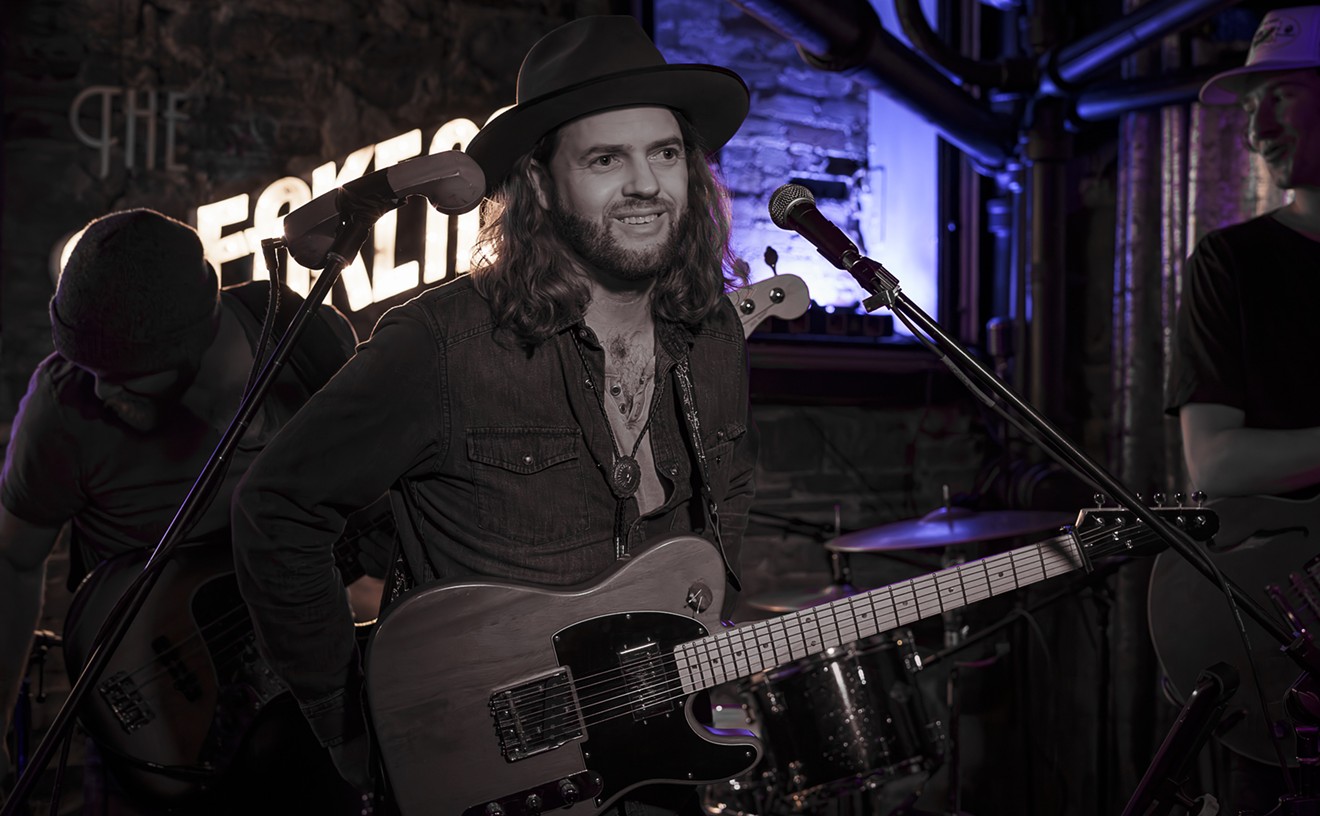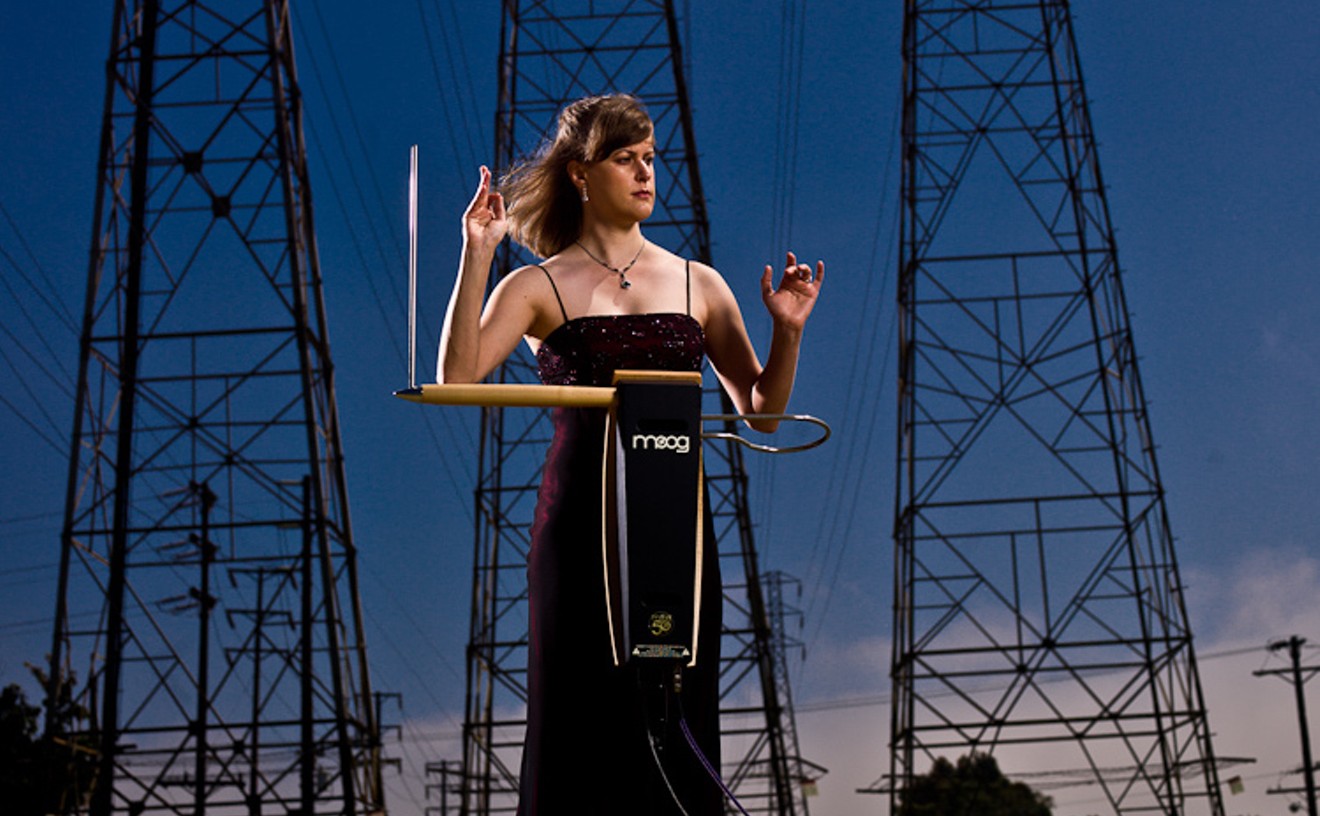"I had to be part of it," Nathan declares. "I remember when I got 'I Don't Buy It' on my dorm-room computer. It was better than half of the stuff I had on my iTunes at the time. I think it's one of the best songs that he's written on his own. I would've been stupid not to move out with my brother -- my friend and my former bandmate -- and get things rolling again."
Just a year apart in age, the Meese brothers grew up in Cleveland, where, bonded by a shared fondness for early-'90s grunge, they played together in bands as teenagers. Nathan was always a mama's boy, he admits, while Patrick was the fearless, adventurous one -- too adventurous for his parents' liking. By the age of seventeen, he'd developed a drug problem that his folks dealt with in short order.
"Both of my parents are recovering alcoholics," Patrick reveals. "So they saw the warning signs and kind of overreacted, but kind of not. I woke up one day and this guy's standing over my bed, and he said, 'You're going to Montana.' I'm like, 'Uh, no.' And he said, 'Yeah, come downstairs,' and they had an intervention.
"I tried to run away, the police were involved, it was really messy," he continues. "I never got to say goodbye to any of my friends. So they sent me to inpatient rehab in Montana, where I did two months. It was tough, you know. It took me a few weeks to stop hating my parents, especially. I don't know if I was necessarily addicted to the drugs that I was doing, but I was definitely addicted to my friends and my social life. I needed to be accepted, is what it came down to. So for me to be taken out of that, I was horribly resentful. Because I was missing out on everything, and that's the one thing I didn't want -- to miss out."
Nathan opted to stay at a friend's house during the intervention. "I was just about to enter my sophomore year in high school," he remembers. "It was a lot to deal with. There was definitely a feeling of 'There goes my brother' -- and we had a band going at the time -- and my friend." Losing a brother to rehab was like a living embodiment of the DARE program.
"I kind of dabbled myself a little bit," Nathan notes, "but for the most part, I just kind of hung back. I had my own group of friends, and we weren't as into drugs. And like Pat said, our parents are recovering, too. And people always say it's in your blood and be careful. It's definitely something I think about and used to think about."
Meanwhile, after a 65-day stint in Montana, Patrick was transferred to another treatment facility in northern Idaho, where he completed almost a year of treatment. "It was like a boarding school-slash-rehabilitation-slash-behavioral center," he remembers. "There were only 25 kids there, way up in the mountains. It's based upon Alcoholics Anonymous. But there were a lot of Christian people up there; 95 percent of the people who worked up there were Christians. That's where I really started to define my spirituality. I had a couple very meaningful experiences that kind of shaped me in a really short period of time. I realized that I really needed to stay sober. But I also realized that I just needed to be a better person. I think it was more of a spiritual awakening."
His bunkmate was a crack-addled kid who'd recently become a Christian. Rather than listen to his proselytizing, Patrick began reading the Bible on his own. And then something happened that changed everything. "I had this dream where I met Jesus," he says. "There was a lot to the dream, a lot of energy going back and forth, and that did it. And then, later on, I had another very intense dream, and I still don't understand what it means. But those two dreams are what have sustained my faith thus far, because I've had a lot of reasons to abandon it."
Patrick's parents weren't as quick to embrace his religious conversion.
"They were frightened at first," Patrick says, chuckling. "And now that I look at it, they had good reason to be, 'cause I was in northern Idaho. There's a lot of weirdos up there, a lot of Christian, super-right-wing weirdos. My parents were kind of freaked out. And I can see why they were skeptical at first. But then they realized it was an evangelical kind of thing. I mean, they'd be supportive of anything I'd do, which is great.
"My spirituality is the reason why I'm alive," he adds. "It's the meaning of my life. Music wouldn't mean anything if I didn't have a reason why I was doing it."
In 2001, Patrick emerged from rehab truly born again. With more than a year of sobriety under his belt, he enrolled at Colorado Christian University in Lakewood. Initially an English major, he soon switched his focus to pursuing a music degree and began playing drums in an outfit called The Turning. He eventually split from the band and began writing his own songs. And in 2004, as part of a student project, he headed to FTM studios and recorded I Don't Buy It, an ambitious eight-song solo effort that showcased his honeyed tenor.
Patrick sent his brother the title track, and that was enough to convince Nathan to join his brother in Denver. At the time, Patrick was a solo artist performing with a revolving lineup. With Nathan on guitar, the brothers now formed Meese, and the following spring released The Oh No EP, essentially I Don't Buy It repackaged under the Meese moniker, with three new songs.
Bolstered by the addition of drummer Ben Haley and bassist David Vanderman, who'd played on Patrick's earlier recordings, the brothers began working on songs for their debut full-length, Our Album Year, which they recorded in the basement of the home they share in Lakewood. Now joined by guitarist Mike Ayars, the band will celebrate the release of the disc -- a stunning, diverse collection of earnest, contemplative songs -- on April 8.
On its myspace page, Meese lists a litany of influences -- Elbow, Sufjan Stevens, the Album Leaf, Radiohead, Death Cab for Cutie, Sigur Rós, Frou Frou and Trent Reznor, among others -- and many can be connected in dot-to-dot fashion when you hear the new material. Whereas past efforts were decidedly piano-driven, Year finds Meese branching out in multiple directions, yet remaining consistently cohesive. "Letters," for instance, is a buoyant track that evokes Fold Zandura applying for the Postal Service, while "Old Enough" plods deliberately and assuredly -- like Death Cab for Cutie driven by Paul Simon. "Audiobody," another intriguing composition, is a primarily electronic track that imagines Imogen Heap playing "Hide and Seek" on Her Space Holiday. The most arresting of the new songs, though, is the Sufjan Stevens-owing "The Champion," a cut Patrick says was inspired by a Motown legend his dad exposed his sons to.
"Earlier this year, I was listening to a ton of Stevie Wonder," Patrick explains, "and his musicality! His chord changes are his signature. They're the most interesting out there, but they still fit within the realm of a pop song, you know? And I try to incorporate a lot of that just to make even the chord progressions interesting, which makes the melody more interesting. I did that a lot on the new CD, I think, like on 'The Champion,' moving it around like a hymn and working a melody around that like he does."
The Reznor influence is harder to pinpoint. Listening to the sunny melodies that dominate Year, you'd need an industrial-sized metal detector to find even a single Nail used in its construction. "Trent Reznor is an electronic pioneer," Patrick says. "Part of me would really love to do only depressing albums, really dark stuff. Most of what I listen to is dark stuff."
Like Reznor, who's now clean and sober, Patrick has emerged from the dark. He's firmly on the wagon and has no plans to fall off. "My parents spent $60,000 on rehab all together, because they cared," he says. "The proof's in the pudding, you know. And the pudding cost $60,000. I'm not going to mess with that. And spiritually, it's like, I don't need this. This is only to make me feel better. A $3 beer or $4 beer -- that I can't afford, first off -- isn't worth it. I want to be here and in the moment."
And this is certainly the moment for his music. Although his EPs both met with acclaim, Year should propel Meese to the next level.
"With how fast things have been moving," Patrick concludes, "it's easy to just become obsessed with that. And that's not the guy I want to be. It's about enjoying life and enjoying where I'm at. If I keep focusing too much on the future, it's going to make right now suck."
One day at a time, sweet Jesus.










